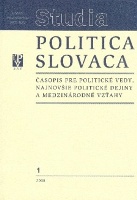Alexander Dubček a Európa
Alexander Dubček and Europe
Author(s): Ivan LaluhaSubject(s): Politics / Political Sciences
Published by: SAV - Slovenská akadémia vied - Ústav politických vied Slovenskej akadémie vied
Keywords: Dubček; Europe; diplomatic activity; Europeanism; common European House
Summary/Abstract: As a result of the economic lagging of the country compared to Western Europe in the 1960s, even before our inclusion in the sphere of infl uence of the Soviet Union, Alexander Dubček gradually became aware of the need to overcome the country’s isolation and establish economic cooperation. The year 1968 showed our adherence to European values. Following the suppression of the reformist movement, Dubček’s European orientation became the more salient; even in the period of political isolation and persecution in the 1980s he put forward the notion of “a common European house”, where he also incorporated the countries of Central Europe, understanding it as an expression of the system of common cultural values of the nations of Europe. Extensive diplomatic activity of Alexander Dubček during his term in offi ce as President of the Federal Assembly in 1990-1992 helped open the door to Europe and its institutions. Dubček’s Europeanism formed gradually, presenting a process of active overcoming of totalitarianism and an expression of the vision of new Europe on the principles of democracy, solidarity and equality of nations. It has become part of humanitarian traditions of European politics. Alexander Dubček was one of those Slovak politicians who, like Štefánik, Hodža or Clementis, saw a guarantee of security and prosperity of his country in different models of a cooperating and integrating Europe. The fi rst steps of the emerging Slovak statehood (autumn 1992) followed on from his initiative and demonstrated the interest of the Slovak Republic in the European structures and the country’s readiness to participate in their activities.
Journal: Studia Politica Slovaca
- Issue Year: I/2008
- Issue No: 1
- Page Range: 115-128
- Page Count: 14
- Language: Slovak

